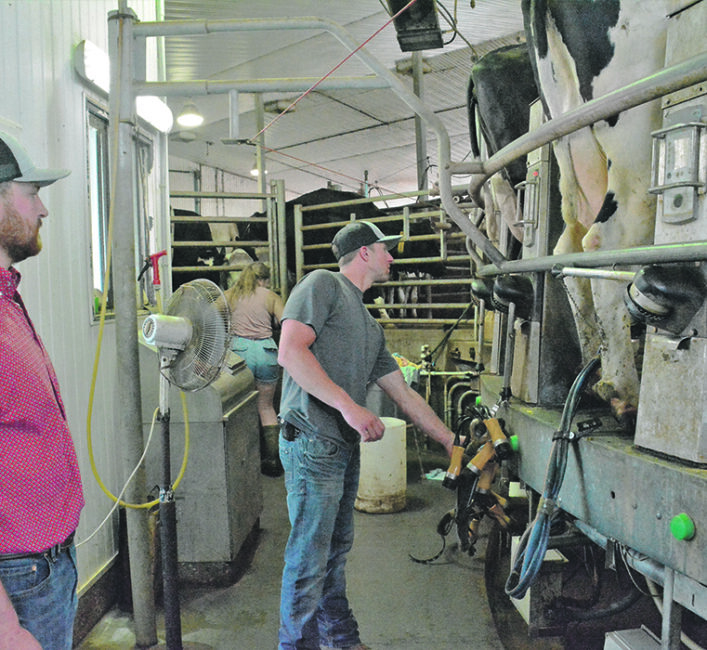Hatview Dairy makes it work in southern Alta.

On the Farm: Three generations of Weisses have operated their successful dairy just outside Medicine Hat for 70 years
The Prairies are best known for growing breadbasket crops and hosting the largest cattle herds in the nation.
However, when it comes to dairy, Alberta doesn’t come top of mind.
It may even be surprising to some that the province has the country’s third highest number of dairy farms — at slightly more than 500 — behind Ontario and Quebec.
It wasn’t always that way for the province, says Hatview Dairy owner Keith Weiss. Alberta was once home to thousands of dairy farms when his parents, Herb and Matilda, started the operation on the edge of Medicine Hat in the 1940s.
Even in the heart of the region best known for its short-grass prairie, expansive cattle ranches, natural gas and hot, dry weather, there were once enough dairy farms in southeastern Alberta to have a Medicine Hat Milk Producers association, Weiss said.
Medicine Hat’s Alpha Dairy, which once supported the local producers, has long since closed and the building converted to loft-style apartments.
The arid southeastern Alberta climate, which can make a slight wind in 30 C summer temperatures feel like a blow dryer against the skin, isn’t exactly a stereotypical backdrop for a dairy operation, either.
However, for 70 years, Hatview Dairy has been a going concern with the farm now being operated by Weiss and his sons, Quinton and Parker.
“Dairy has always been a steady income, steady workload,” he said. “It’s a stable profession.”
Herb died in 2014, while Weiss’s brother, Gerald, passed away last year. However, at 88, Matilda “still does the books.”
Hatview is one of the few remaining dairies in southeastern Alberta outside of a few run by Hutterite colonies.
It’s also one of the larger operations in the province, says Quinton, with 175 Holsteins milking for most of the year and the number expanding to 215 during the higher quota months of July through October.
“We could be bigger, but you have to buy the allotments,” said Parker.

Their father said that while supply management has been used as a political football in Canada-U.S. trade relations, “there are places that envy our system when they are unable to pay the bills.”
One complication is the new North American free trade agreement, which opens up the Canadian dairy market to U.S. producers. It has been in effect for barely a year.
“We haven’t felt the full ramifications,” Weiss said.
Rapidly evolving technology has also seen changes in how dairy operations work with a move toward robotics, which allows for automated milking 24 hours a day.
Using a carousel that spins cows on and off twice a day might allow Hatview to add an extra milking but it would require some hands-on work.
Not moving in that direction means “you’re not fixing machines all night,” Weiss said.
Hatview has managed other challenges by sharing transportation costs with a nearby colony, diversifying their operation to include a bull breeding operation and keeping most costs in-house with 3,000 acres of irrigated farmland surrounding the dairy.
Fertilizer for the canola, wheat, durum, hay and alfalfa crops that ring the farm comes from the dairy operation.
However, being a farming operation tucked next to a small but expanding city brings other pressures. The farm moved from the city limits in 2005 to about 20 kilometres down the road as Medicine Hat started encroaching.
As well, there is always the call for a life outside the farm.
For Quinton, that call was a career in law enforcement, which saw him dip his toes into the waters outside the farm, working as an Alberta sheriff for several years. For Parker, it was an agri-business degree at the University of Saskatchewan.
“It was good to get out and work for someone else,” said Quinton, who came back to the family farm full time a couple of years ago. “But better to work for us and myself.”
Parker said he left the farm but always intended to come back.
“if you stay in one spot, you don’t learn.”
Weiss said he worked off the farm himself as a mechanic in Medicine Hat and has encouraged his sons to do the same. His father worked as a machinist at Medicine Hat’s Alberta Clay Products factory, splitting time between the two jobs before going all in at the farm.
He doesn’t anticipate the family will leave dairy farming any time soon.
“You get attached to it,” he said. “It just gets into you.”
Source: producer.com


